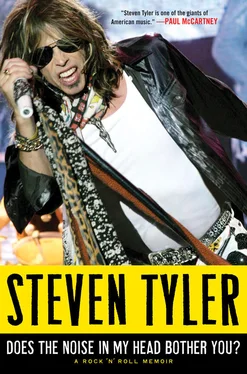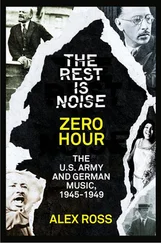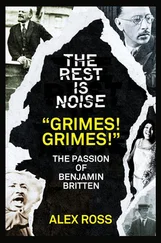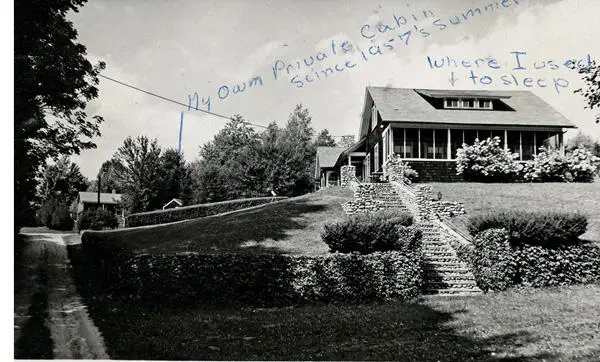
Trow-Rico Lodge and the lawn I was mowing when Joe Perry drove up, summer of ’69. (Ernie Tallarico)
And like Alice I entered another dimension: the sixth dimension (the fifth dimension was already taken). Since then, I can go to that place anytime I want, because I know the secret of the children of the woods; there’s so much in silence when you know what you’re hearing—what dances between the psychoacoustics of any two notes and what reads between the lines is akin to the juxtaposition of what you see when you look in the mirror. My whole life has been dancing between these worlds: the GOAN ZONE, the Way-Out-o-Sphere and . . . the UNFORTUNATE STATE OF REALITY. In essence, I call myself a peripheral visionary. I hear what people don’t say and I see what’s invisible. At night, because our visual perception is made up of rods and cones, if you’re going down a dark path, the only way to really see the path is to look off and see it in your peripheral vision. But more on this as we progress, regress, and digress.
When I finally got pulled out of the rabbit hole, my parents brought me back to the third dimension. Like all parents they were concerned, but I was afraid to tell them that I have never felt more comfortable than being lost in that forest.
In Manhattan we lived at 124th Street and Broadway, not far from the Apollo Theater. Harlem, man. If the first three years of your life are the most informative, then surely I needed to hear that music, and I was inspired by the noise coming out of that theater. It had more soul than Saint Peter.
A few years ago I was back at the Apollo, and saw the park where my mom had pushed me in my carriage. My first visual memory is from THAT PARK: trees and clouds moving above my head as if I were floating above the earth. There I am, a two-year-old astral-projecting infant. At age four, I remember going to get a gallon of milk with two quarters, walking with my mom hand in hand through passages and corridors of the basement of our building and through tunnels into the adjoining building where the milk machine was. I thought I was . . . God knows where. I might as well have been on Mars. Ah, it was the mysterious world of childhood, where someone is always leading you by the hand through a dark passageway and into a brand-new world just waiting for the child’s overactive imagination to kick in.
My mother lit the fire that would keep me warm for the rest of my life. She read me parables, Aesop’s Fables, and Rudyard Kipling’s Just So Stories. Children’s tales and nursery rhymes from the eighteen hundreds, nineteen hundreds: “Hickory Dickory Dock,” Andrew Lang’s The Nursery Rhyme Book, Hans Christian Andersen, Helen Bannerman’s Little Black Sambo. So great! Never mind the “Goose That Laid the Golden Egg!” My mom would read me all these stories every night at bedtime. But one night when I was around six, she stopped.
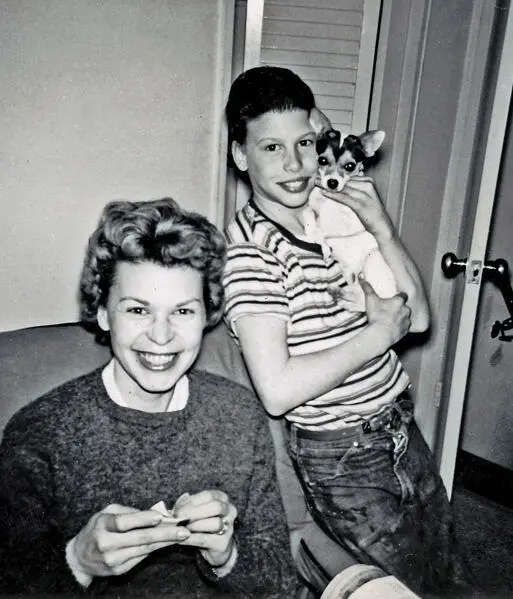
Happy days—Mom and me and Crickett, my Toy Fox Terrier, 1954. (Ernie Tallarico)
“You gotta learn how to read ’em yourself,” she said. Up until then I’d been reading along with her as she pointed to the words. We did this for months until she knew I kinda had the idea, then suddenly there’s no Mom looking over my shoulder. She just left the book by my bed and I became distraught. “Mom, I wanna hear the stories. Why won’t you read to me anymore?!” I said. And then one night I thought to myself, “Uh-oh, now I gotta get smart.” Naah. . . . I’ll just become a musician and write my own stories and myths . . . Aeromyths.
Mom used to tell me of a man she’d seen on the Steve Allen Show, in 1956 when I was eight. His name was Gypsy Boots. He was the original hippie, a guy who lived in a tree with hair down to his waist and who promoted health food and yoga. Gypsy was the protohippie. In the early thirties he had dropped out of high school, wandered to California with a bunch of other so-called vagabonds, lived off the land, slept in caves and trees, and bathed in waterfalls. I was totally seduced by that lifestyle. Boots’s message was this: As primitive as his world seemed, he wanted people to think that he would live forever. Hey, he almost did, dying just eleven days before his ninetieth birthday in 1994.
Next in my life came a bohemian composer named Eden Ahbez, who wrote a song called “Nature Boy” (which my mom heard on a Nat King Cole record). He camped out below the first L in the Hollywood sign, studied Oriental mysticism, and, like Gypsy Boots, he lived on vegetables, fruits, and nuts. My mom sang that song to me before I went to sleep. I’ll never forget how it made me think that I was her nature boy.
The song tells the story of how one day an enchanted wandering Nature Boy—wise and shy, with a sad, glittering eye—crosses the path of the singer. They sit by the fire and talk of philosophers and knaves and cabbages and kings. As the boy gets up to leave he imparts the secret of life: To love and be loved is all we know and all we need to know. With that Nature Boy vanishes into the night as mysteriously as he had come.
Unfortunately the people who own the rights to “Nature Boy” won’t let me publish the actual words to the song in this book (still, you can just Google them), but I promise it will be on my solo album come hell or high water.
Then there was Moondog. What a fantastic character, a blind musician who dressed up like a Viking with a helmet and horns and a spear to match. He hung out on the corner of Fifty-sixth Street and Sixth Avenue. I saw and smelled him every morning on my way to school. Oddly enough, he lived up in the Bronx, apparently in the woods, back behind the apartment buildings I grew up in. Was that a coincidence or was that God secretly telling me, “Steven, thou shalt become the Moondog of your generation”? Or at least the leader of a rock ’n’ roll band.
What I heard about Moondog was that he wrote “Nature Boy,” but what do I know? Maybe Eden Ahbez is Moondog spelled backward. . . .
My mother’s birth name was Susan Rey Blancha. At sixteen she joined the WACs (Women’s Army Corps). She met my dad while they were both at Fort Dix in New Jersey during World War II. One night he had a date with a woman who was rooming with my mom. The roommate stood him up, and instead he was greeted by my mother, who happened to be playing the piano at the time. My dad walked over to her and said, “You’re playin’ it wrong.” It was love at first fight! They got married and had lil ol’ Lynda, my sister, and lil ol’ me came two years later. Ha-ha! That’s my mom, that’s my dad, and that’s why I’m so fuckin’ detail-oriented—and such a maniac. I got the traits that I don’t want and the ones I do. Because you’re an offspring, you pick up those traits unconsciously, in case you haven’t noticed. You become your mom!
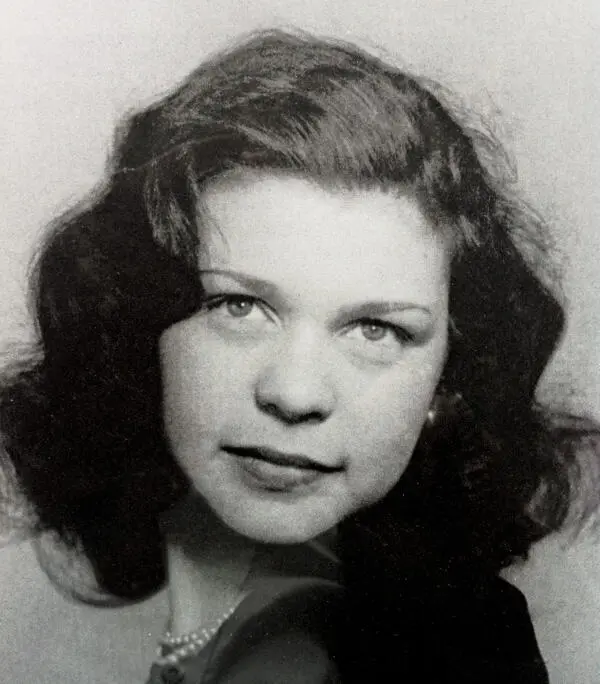
My mother, Susan Rey Blancha, at eighteen in 1932. (Ernie Tallarico)
So that’s how I happened, 1948, a rare mixture of classical Juilliard boy meets country pinup girl, who, by the way, looked like a cross between Jean Harlow and Marlene Dietrich with a tinge of Elly May Clampett. And if God’s in the details—and we know She is—then I’m the perfect combination. I’m the N in my parents’ DNA. So now, if anyone’s mad at me and calls me a dick, I know they really mean Fort Dix. My daughter Chelsea always thought God was a woman from the day she was born. It was so nurturing hearing that from a child, that God would have to be a woman, that I just never questioned it. (No wonder I keep watching Oprah.)
Читать дальше
